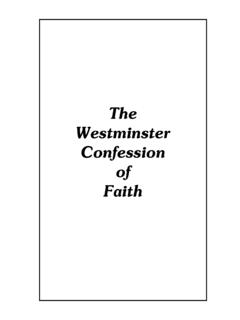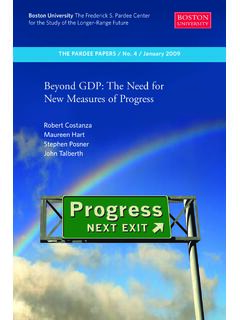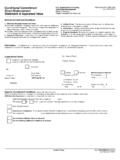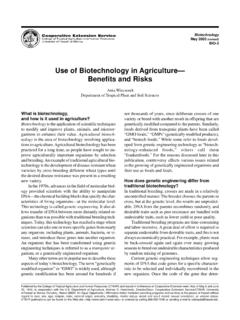Transcription of The Westminster Shorter Catechism
1 TheWestminsterShorterCatechism107 TheWestminsterShorter CatechismQ. 1. What is the chief end of man?A. Man s chief end is to glorify God, and to enjoy him 2. What rule hath God given to direct us how we mayglorify and enjoy him?A. The word of God, which is contained in the Scriptures of the Oldand New Testaments, is the only rule to direct us how we may glorifyand enjoy 3. What do the Scriptures principally teach?A. The Scriptures principally teach what man is to believeconcerning God, and what duty God requires of 4. What is God?A. God is a Spirit, infinite, eternal, and unchangeable, in his being,wisdom, power, holiness, justice, goodness, and 5.
2 Are there more Gods than one?A. There is but one only, the living and true 6. How many persons are there in the Godhead?A. There are three persons in the Godhead: the Father, the Son, andthe Holy Ghost; and these three are one God, the same insubstance, equal in power and 7. What are the decrees of God?A. The decrees of God are, his eternal purpose, according to thecounsel of his will, whereby, for his own glory, he hath foreordainedwhatsoever comes to 8. How doth God execute his decrees?A. God executeth his decrees in the works of creation andprovidence. THE Shorter CATECHISM108Q. 9. What is the work of creation?A. The work of creation is, God s making all things of nothing, by theword of his power, in the space of six days, and all very 10.
3 How did God create man?A. God created man male and female, after his own image, inknowledge, righteousness, and holiness, with dominion over 11. What are God s works of providence?A. God s works of providence are, his most holy, wise, and powerfulpreserving and governing all his creatures, and all their 12. What special act of providence did God exercisetowards man, in the estate wherein he was created?A. When God had created man, he entered into a covenant of lifewith him, upon condition of perfect obedience; forbidding him to eatof the tree of the knowledge of good and evil, upon the pain 13. Did our first parents continue in the estate whereinthey were created?
4 A. Our first parents, being left to the freedom of their own will, fellfrom the estate wherein they were created, by sinning against 14. What is sin?A. Sin is any want of conformity unto, or transgression of, the law 15. What was the sin whereby our first parents fell fromthe estate wherein they were created?A. The sin whereby our first parents fell from the estate wherein theywere created, was their eating the forbidden 16. Did all mankind fall in Adam s first transgression?A. The covenant being made with Adam, not only for himself, butfor his posterity; all mankind, descending from him by ordinarygeneration, sinned in him, and fell with him, in his first Shorter CATECHISM109Q.
5 17. Into what estate did the fall bring mankind?A. The fall brought mankind into an estate of sin and 18. Wherein consists the sinfulness of that estatewhereinto man fell?A. The sinfulness of that estate whereinto man fell, consists in theguilt of Adam s first sin, the want of original righteousness, and thecorruption of his whole nature, which is commonly called originalsin; together with all actual transgressions which proceed from 19. What is the misery of that estate whereinto man fell?A. All mankind, by their fall, lost communion with God, are underhis wrath and curse, and so made liable to all miseries in this life, todeath itself, and to the pains of hell 20.
6 Did God leave all mankind to perish in the estate ofsin and misery?A. God, having, out of his mere good pleasure, from all eternity,elected some to everlasting life, did enter into a covenant of grace,to deliver them out of the estate of sin and misery, and to bring theminto an estate of salvation by a 21. Who is the Redeemer of God s elect?A. The only Redeemer of God s elect is the Lord Jesus Christ, who,being the eternal Son of God, became man, and so was, andcontinueth to be God and man, in two distinct natures, and oneperson, 22. How did Christ, being the Son of God, become man?A. Christ, the Son of God, became man, by taking to himself a truebody, and a reasonable soul, being conceived by the power of theHoly Ghost, in the womb of the Virgin Mary, and born of her, yetwithout 23.
7 What offices doth Christ execute as our Redeemer?A. Christ, as our Redeemer, executeth the office of a prophet, of apriest, and of a king, both in his estate of humiliation and exaltation. THE Shorter CATECHISM110Q. 24. How doth Christ execute the office of a prophet?A. Christ executeth the office of a prophet, in revealing to us, by hisword and Spirit, the will of God for our 25. How doth Christ execute the office of a priest?A. Christ executeth the office of a priest, in his once offering up ofhimself a sacrifice to satisfy divine justice, and reconcile us to God;and in making continual intercession for 26. How doth Christ execute the office of a king?
8 A. Christ executeth the office of a king, in subduing us to himself, inruling and defending us, and in restraining and conquering all hisand our 27. Wherein did Christ s humiliation consist?A. Christ s humiliation consisted in his being born, and that in a lowcondition, made under the law, undergoing the miseries of this life,the wrath of God, and the cursed death of the cross; in being buried,and continuing under the power of death for a time. Q. 28. Wherein consisteth Christ s exaltation?A. Christ s exaltation consisteth in his rising again from the dead onthe third day, in ascending up into heaven, in sitting at the righthand of God the Father, and in coming to judge the world at the 29 How are we made partakers of the redemptionpurchased by Christ?
9 A. We are made partakers of the redemption purchased by Christ, bythe effectual application of it to us by his Holy 30 How doth the Spirit apply to us the redemptionpurchased by Christ?A. The Spirit applieth to us the redemption purchased by Christ, byworking faith in us, and thereby uniting us to Christ in our 31. What is effectual calling?A. Effectual calling is the work of God s Spirit, whereby, convincingus of our sin and misery, enlightening our minds in the knowledgeTHE Shorter CATECHISM111of Christ, and renewing our wills, he doth persuade and enable us toembrace Jesus Christ, freely offered to us in the 32.
10 What benefits do they that are effectually calledpartake of in this life?A. They that are effectually called do in this life partake ofjustification, adoption, and sanctification, and the several benefitswhich, in this life, do either accompany or flow from 33. What is justification?A. Justification is an act of God s free grace, wherein he pardonethall our sins, and accepteth us as righteous in his sight, only for therighteousness of Christ imputed to us, and received by faith 34. What is adoption?A. Adoption is an act of God s free grace, whereby we are receivedinto the number, and have a right to all the privileges, of the sons 35.








